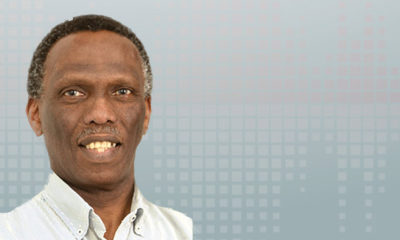Somaliland
Somaliland President Holds Historic Consultation with Former Leaders to Strengthen National Unity
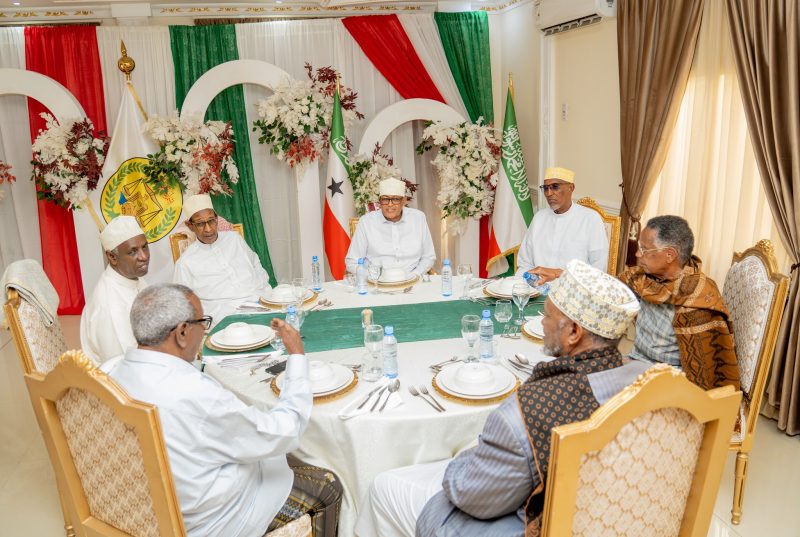
President Cirro meets with former presidents and vice-presidents to discuss national priorities and reinforce Somaliland’s unique identity.
In a significant move to reinforce national unity and continuity, the President of Somaliland, Abdirahman Mohamed Abdilahi (Cirro), convened a consultative meeting with former presidents and vice-presidents of Somaliland. The meeting, held in the spirit of collaboration, focused on the current priorities and challenges facing the Republic of Somaliland.
Participants in the Historic Meeting

The consultation brought together a distinguished group of former leaders, including:
Muse Bihi Abdi: 5th President of Somaliland.
Dahir Riyale Kaahin: 3rd President of Somaliland.
Ahmed Yusuf Yassin: 3rd Vice President of Somaliland.
Abdirahman Aw Ali Farah: 2nd Vice President of Somaliland.
Bashe Mohamed Farah: Former Chairman of the Somaliland House of Representatives.
While some leaders, such as 4th and 5th Vice President Abdirahman Abdilahi Ismail (Sailici) and 1st Vice President Hassan Isse Jama, were unable to attend due to personal circumstances, their contributions were acknowledged and respected.
The inclusion of current Vice President Jam. Mohamed Ali Aw Abdi underscores the government’s commitment to bridging past and present leadership to foster collective wisdom and direction.
Key Issues Discussed

The discussions centered on several pivotal topics:
National Security and Stability: Addressing immediate concerns to ensure peace and cohesion.
Special Priorities for Somaliland: Exploring strategies to bolster governance, development, and Somaliland’s unique identity in the Horn of Africa.
Strengthening National Unity: Reinforcing the shared vision of Somaliland as a distinct and stable nation amid regional challenges.
The meeting reflected Somaliland’s governance ethos, which prioritizes collaboration and unity, distinguishing it from neighboring regions.
Symbolism and Impact

President of Somaliland, Abdirahman Mohamed Abdilahi (Cirro)
This consultative gathering holds deep symbolic and practical significance:
Unity of Leadership: By bringing together past and present leaders, the meeting projects an image of solidarity and shared responsibility.
Continuity and Wisdom: Leveraging the experiences of former presidents and vice-presidents ensures that national policies benefit from institutional memory and diverse perspectives.
Message to Citizens: The visible collaboration among leaders fosters public confidence in Somaliland’s governance and strengthens nationalism.
Conclusion

The consultative meeting hosted by President Cirro exemplifies Somaliland’s commitment to inclusive governance and national cohesion. As the country navigates pressing challenges and opportunities, the engagement of past and present leaders underscores a collective dedication to the well-being and unity of its people.
This event serves as a testament to Somaliland’s unique political culture, setting it apart as a beacon of stability and collaboration in the region.
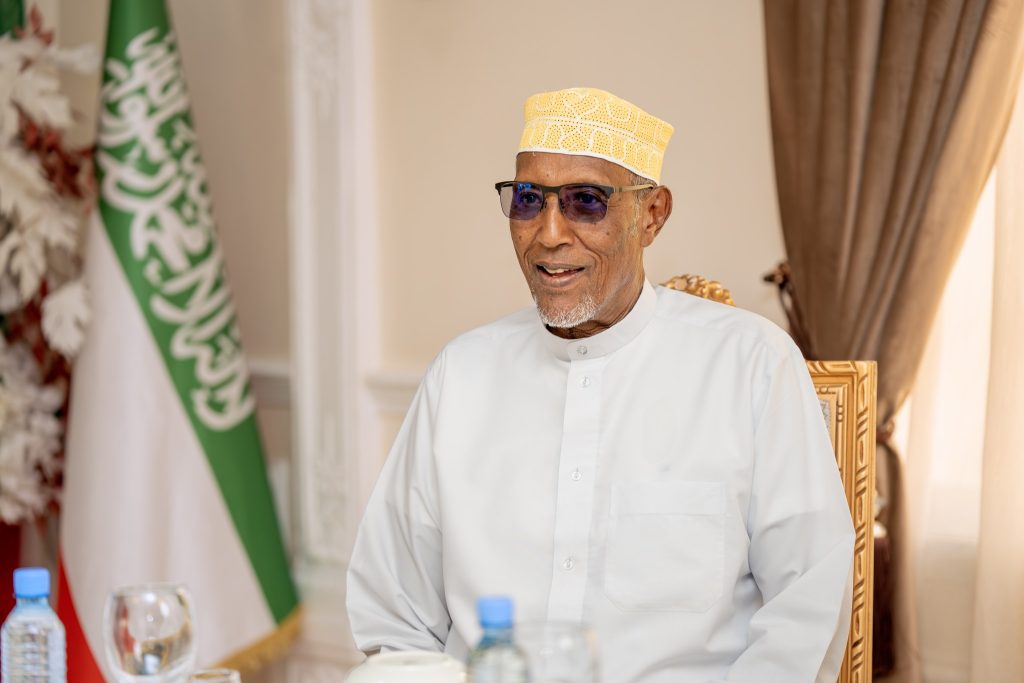
Muse Bihi Abdi: 5th President of Somaliland.
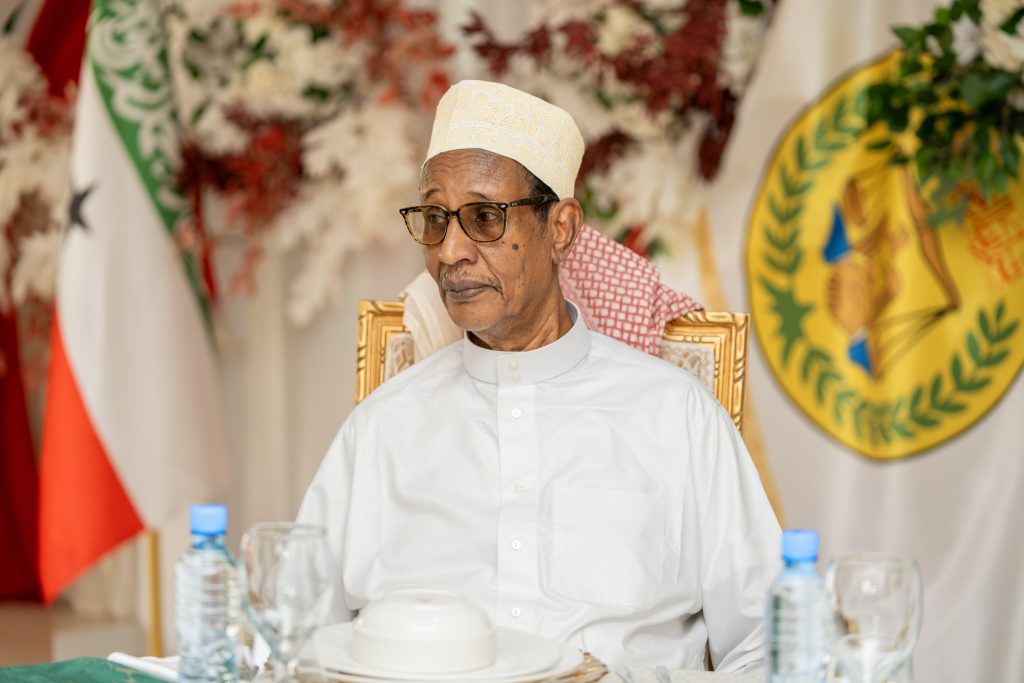
Dahir Riyale Kaahin: 3rd President of Somaliland.
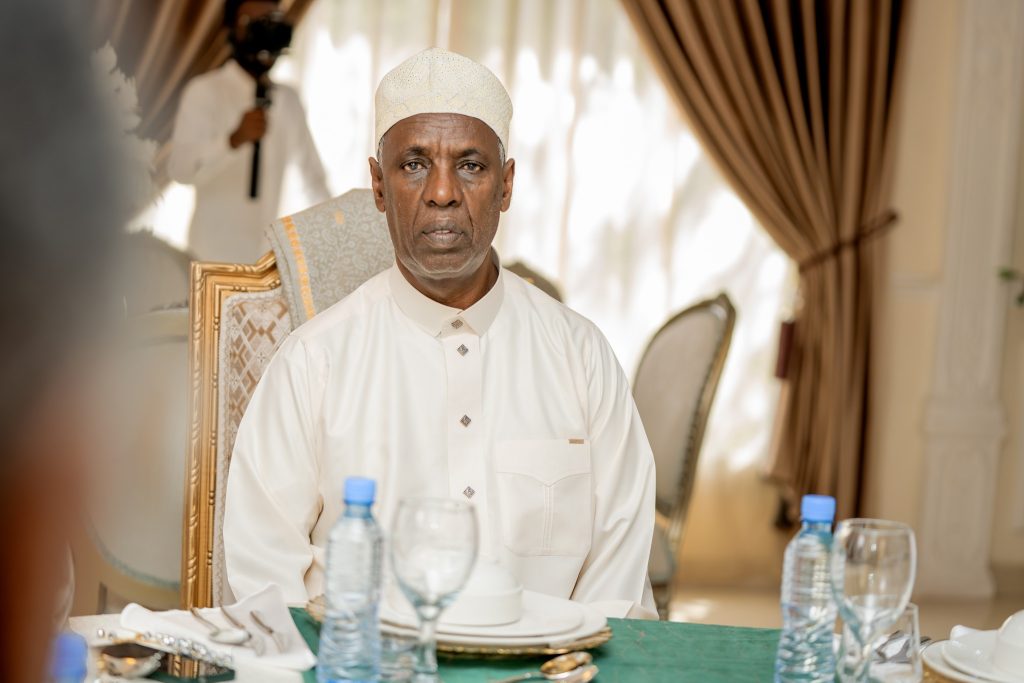
Somaliland Vice President. Mohamed Ali Aw Abdi
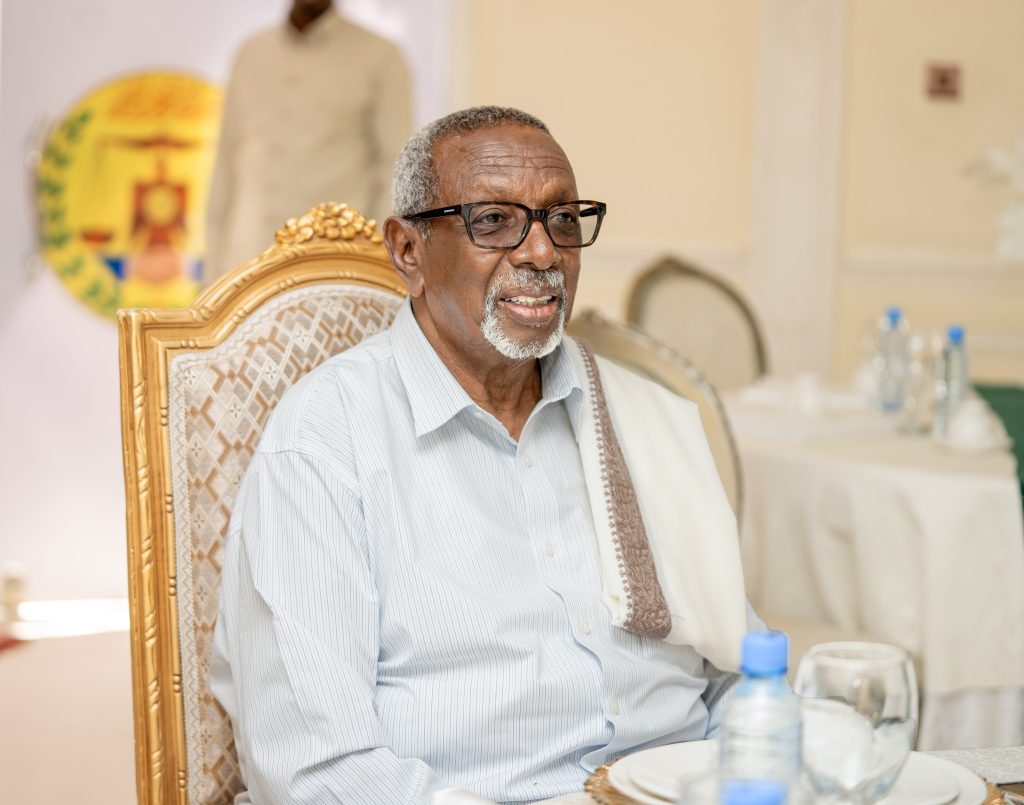
Abdirahman Aw Ali Farah: 2nd Vice President of Somaliland.
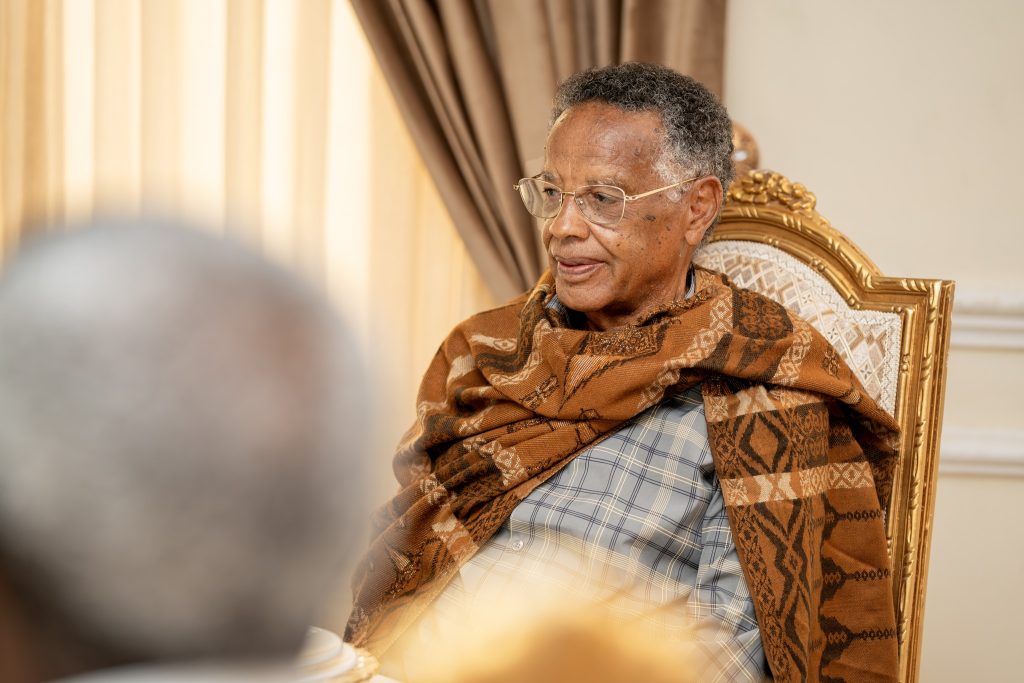
Bashe Mohamed Farah: Former Chairman of the Somaliland House of Representatives.

Ahmed Yusuf Yassin: 3rd Vice President of Somaliland.
Somaliland
Somaliland Activist Coldoon Arrested Again in Berbera Over Gaza Refugee Criticism
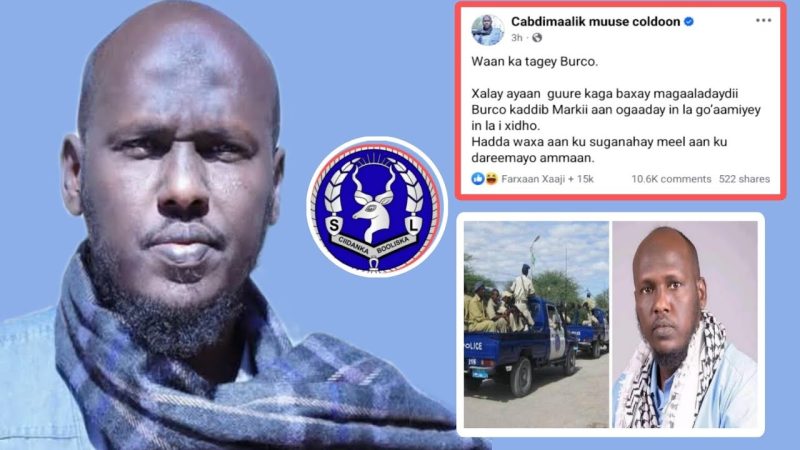
Charity worker Coldoon detained after denouncing Somaliland’s alleged plan to accept Gaza refugees; rights groups slam renewed crackdown on free speech
Abdimaalik Muse Coldoon, a charitable worker and activist, has been arrested in Berbera after criticizing Somaliland’s stance on Gaza refugees. His detention sparks outcry over freedom of speech violations.
Somaliland Arrests Vocal Charity Worker Abdimaalik Coldoon After Criticism of Gaza Refugee Report
In a move reigniting tensions over freedom of speech in Somaliland, charitable worker and outspoken social media activist Abdimaalik Muse Coldoon was arrested Thursday in the port city of Berbera. While no formal charges have been announced, sources close to the case suggest the arrest was triggered by Coldoon’s vocal criticism of a recent Al Jazeera Arabic report claiming that Somaliland would be willing to receive refugees from war-torn Gaza.
Coldoon, a prominent public figure known for both his humanitarian work and fiery commentary, had earlier fled his hometown of Burao, fearing arrest. Though persuaded by family and community elders to return with reassurances that he would not be targeted, he was detained shortly after traveling from Burao to Berbera.
His recent remarks, which are believed to have provoked the authorities, included a rejection of any implication that the Somaliland government represents Somalis in broader geopolitical issues. “I am from Somalia, and the minister does not represent us… The Palestinians are our brothers,” he said, rejecting any plans to accept Gaza refugees under what he called a “mercenary government.”
While officials have remained tight-lipped about the reason for his detention, human rights advocates and political figures have decried the arrest as an assault on civil liberties. Justice Minister Yoonis Ahmed Yoonis—previously a key figure in the Waddani opposition party—condemned the act as unlawful. “Coldoon is being held simply for exercising his constitutional right to speak. This is a blatant violation of freedom of expression,” he said.
This isn’t the first time Coldoon has clashed with Somaliland authorities. His arrest record dates back to 2017, when he publicly supported former Somali president Mohamed Abdullahi Farmaajo. He was previously jailed on charges of defamation and false information targeting educational institutions, though he was later acquitted.
Coldoon’s ongoing persecution marks yet another disturbing chapter in Somaliland’s tightening grip on dissent. Despite being a self-declared democracy, the government’s continued targeting of critics casts serious doubt on its commitment to basic human rights. Until his release, Abdimaalik Coldoon’s case will remain a litmus test for Somaliland’s fragile tolerance for free speech.
Editor's Pick
Panic in Mogadishu: Somalia Begs Elon Musk to Block Somaliland Recognition

Somali regime scrambles to sabotage Somaliland’s U.S. recognition push by lobbying Elon Musk, Christian right, and MAGA allies
As Somaliland inches closer to U.S. recognition, Mogadishu turns to Elon Musk and Trump-aligned networks in a desperate bid to block diplomatic momentum and silence Somaliland’s rise.
Desperation in Mogadishu: Somalia Turns to Elon Musk and MAGA Allies to Derail Somaliland Recognition
Somalia’s government has reportedly reached out to tech titan Elon Musk and far-right Christian groups in a frantic bid to stop the United States from recognizing the Republic of Somaliland.
According to a bombshell report by The Africa Report, the Somali government is launching an aggressive influence campaign to sabotage Somaliland’s path to international legitimacy—particularly among U.S. Republicans aligned with Donald Trump. With whispers that Trump’s second-term foreign policy may shift dramatically in favor of Somaliland, Mogadishu is pulling every lever it can find—including religious lobbies and Silicon Valley billionaires.
The plea to Musk, though not officially confirmed, underscores how far the Somali government is willing to go. But this isn’t just about one man. It’s a full-blown anti-recognition operation, complete with hired firms and whisper campaigns to derail bipartisan support for Somaliland’s case in Washington.
Why the panic? Because Somaliland is gaining serious traction among Trump-aligned conservatives who see it as a rare gem in the Horn of Africa—a democratic, stable, pro-American entity surrounded by chaos. It offers strategic access to the Red Sea and Indian Ocean and a partnership that’s not hostage to terrorism, piracy, or internal collapse.
Reports from Semafor and Reuters confirm that Somali President Hassan Sheikh Mohamud has even proposed that his government take over Berbera and Bosaso ports—an audacious bid to undercut Somaliland’s economic autonomy and kill its chances of being seen as self-sufficient.
Mogadishu’s own ambassador to the U.S. admitted the threat openly: recognition of Somaliland, he said, would “damage relations” with Washington. But the real damage lies in Somalia’s failure to offer peace, unity, or even basic governance—while Somaliland has functioned independently for over three decades.
With Somaliland Foreign Minister Abdirahman Dahir Aden landing in Washington this week, the stakes are sky-high. Mogadishu is rattled. Trump allies in Congress are rallying. And Somaliland’s case, long ignored, is now center stage in a geopolitical battle that could redefine U.S. influence in East Africa.
One thing is clear: Somalia isn’t just losing control of the narrative—it’s losing the region’s future. And no billionaire intervention will stop the inevitable tide of Somaliland’s rising recognition.
EDITORIAL
Izak Khomo Exposing the Forgotten Genocide: A Revisitation of Somaliland’s Dark History

In recent commentary, esteemed South African journalist Izak Khomo has fearlessly convened a dialogue that brings to light the often-ignored historical atrocities faced by the people of Somaliland under the brutal regime of dictator Siyad Barre in the late 20th century. His reflections are particularly timely as they illustrate the intricate relationship between historical injustices, contemporary political realities, and overarching humanitarian imperatives.
A Historical Context: The Hidden Currents of the Siad Barre Regime
Khomo’s assertions resonate deeply, particularly when he recalls how the Barre regime forged alliances with the Apartheid government of South Africa. The disturbing truth about South Africa’s engagement in the conflict against the Isaaq people of Somaliland is a dark chapter that has been overshadowed, often lost in the larger narrative of Somali history. By hiring South African air force pilots, who indiscriminately bombed residential areas of Hargeisa, Barre’s government committed acts of violence that led to what many now refer to as the Isaaq genocide.
This partnership between Somalia and South African leaders was born out of a shared interest in suppressing dissent, but the casualties were borne by innocent civilians. The strategic military alliance between Barre and the Apartheid regime exemplifies the lengths to which despots will go to maintain power, revealing a grotesque underbelly of political opportunism wrapped in the guise of national security.
The Weight of Forgotten Histories
Khomo’s framing of Somalia politicians as “opportunists and liars” challenges the status quo, forcing a reckoning with the narratives surrounding Somalia and Somaliland. According to Khomo, the mentality that fueled Barre’s atrocities is far from extinct; it has morphed into contemporary governance that continues to sidestep the urgent need for accountability. As the current Somali government seeks recognition through various international avenues, including recent letters to Western powers, the ghosts of the past—particularly those of the Isaaq genocide—continue to haunt Somaliland.
For those unfamiliar with this dark legacy, Khomo’s commentary serves as an introduction to the complex and painful history of Somaliland and its people—a history that cannot simply be swept under the carpet.
The Resurgence of Ignored Atrocities
In exposing these dynamics, Khomo deftly links the historical reality of Barre’s regime to present-day political instability and conflict in the Horn of Africa. He warns of the impending dangers associated with the hypothetical military alliances being formed today—such as Somalia’s supposed collaboration with Egypt. The idea of Egyptian forces entering the fray under the pretense of peacekeeping raises alarm bells that echo the past; it suggests a cycle of violence that has yet to be fully resolved. The rise of terrorist groups, ongoing struggles with regional adversaries, and territorial ambitions signal potential flashpoints that could ignite further conflict.
Moreover, Khomo draws an intriguing parallel between the response of the international community and the silence surrounding Somaliland’s cries for recognition and support. The historical amnesia surrounding Somaliland’s plight—as highlighted by Khomo—inevitably impacts its ability to forge a path toward international support and recognition. If historical narratives remain truncated, how can the suffering endured by the Isaaq people ever be adequately recognized?
The Moral Imperative for Acknowledgment and Action
Khomo’s powerful expositions compel all of us—especially Somalilanders—to confront a past that may still define our current challenges. For those living in the shadow of these historical events, there lies a profound moral impetus to confront and articulate the narrative of survival and resilience.
Somaliland’s government and its elite must embrace this reckoning, acknowledging the past to build a more robust future. The call to reflect on the Isaaq genocide is not merely to revive painful memories; it is to affirm that such atrocities should never be repeated in the modern context.
Somaliland’s leadership must be vigilant and proactive—it must work to cultivate international alliances that not only recognize the rights of Somalilanders but also demand an end to the violence and historical injustice. The forgotten genocide of the past cannot remain a hallmark of silence; it must become a catalyst for change, empowerment, and justice.
Bridging the Past to Build a Better Future
Izak Khomo’s insights offer a crucial opportunity for reflection and activism among those who care about the narrative of Somaliland. Addressing the historical injustices faced by the Isaaq people is intrinsic to shaping a future for Somaliland that reflects its values of integrity, justice, and sovereignty. Only by recognizing the injustices of the past can Somaliland truly lead itself towards a brighter and more equitable tomorrow.
To move forward effectively, it is essential to weave these historical fabrics into the nation’s identity and advocate for the rightful acknowledgment of past sufferings. Only then can Somaliland emerge not merely as a historical narrative of survival but as a vibrant and sovereign entity ready to confront the challenges of the future with confidence and strength.
Somaliland
Somaliland Actor Yusuf Ceegaag Runs for Parliament After Playing One On TV

In one of the most surreal full-circle moments in Somaliland politics, beloved actor Yusuf Abdullahi Muse — better known to millions as Yusuf Ceegaag — is swapping the small screen for the political stage. Ceegaag, who famously portrayed a lawmaker in hit Somali dramas, is now officially running for a seat in Somaliland’s Parliament. But this time, the votes are real, and so is the power.
Ceegaag confirmed his candidacy in an interview with BBC Somali, laughing off suggestions that his announcement might be “just another role.” The irony? He once played a corrupt man who denied his sister her inheritance — a performance so convincing that fans berated him in public. “That’s when I realized just how powerful a role can be,” he said. “People don’t just watch — they feel.”
Now, Ceegaag is betting that emotional resonance can be transformed into electoral support. “I’ve played the part,” he said. “Now I want to live it.”
He joins a global cast of actors-turned-politicians: Reagan, Schwarzenegger, India’s Vijayakanth, and Ukraine’s Zelensky — the comedian who became a wartime president. But Ceegaag’s story is uniquely Somali. His roles were never just entertainment — they were critiques, reflections of society’s ugliest truths: systemic inequality, corrupt elites, and the quiet suffering of everyday citizens.
From school plays in Hargeisa to prime-time Ramadan TV, Ceegaag built a career on cultural authenticity. He made people laugh, cry, and rage — often within a single scene. And now, he’s asking them to do something even more radical: vote.
His transition from storyteller to statesman underscores a deeper truth about Somali society — that power doesn’t just come from titles or tribes. It comes from trust. And Ceegaag, for all his scripted scandals, has earned something rare: a reputation.
While some joke he’s still “stuck in character,” others say it’s exactly this blend of empathy, performance, and public connection that makes him a compelling candidate. After all, in a political landscape plagued by cynicism and corruption, maybe what Somaliland needs is someone who’s spent decades embodying the people — not exploiting them.
The curtain is rising. The cameras are off. And Yusuf Ceegaag is ready for his next role: parliamentarian.
ASSESSMENTS
A Looming Catastrophe in the Red Sea: Somaliland’s Government Faces Criticism for Silence

As global tensions skyrocket, the Red Sea region edges perilously close to conflict, potentially dragging Somaliland into the eye of a geopolitical hurricane. The convergence of escalating threats involving Yemen’s Houthis, Israel, the United States, Iran, Turkey, and China raises an alarming question: Why has the Somaliland government chosen silence amid such an imminent threat?
Is Somaliland’s Government Ignoring an Impending War at Its Doorstep?
The Middle East is bracing for upheaval as the United States rapidly bolsters its military presence, indicating preparations for conflict that could ripple globally. Iran’s increasingly aggressive rhetoric against Israel intensifies fears of inevitable military clashes. The European Union has proactively instructed citizens to prepare emergency supplies, recognizing the severity of the approaching crisis.
Meanwhile, Somaliland’s strategic silence is deeply concerning. The government’s lack of transparent communication leaves citizens dangerously uninformed about looming threats, sparking criticism and speculation regarding the government’s preparedness and intentions. Somaliland, strategically positioned near critical maritime routes in the Red Sea, risks devastating consequences if conflict spills over, especially with Berbera’s vital port potentially becoming embroiled in regional turmoil.
Turkey’s support for destabilizing factions, such as the Houthis, exacerbates these risks, placing Somaliland in a precarious position. Yet, despite long-standing relationships with Western nations and the UAE, Somaliland’s leadership remains notably absent from the critical dialogues shaping their region’s fate.
The Somaliland government’s silence starkly contrasts the transparency shown by European nations actively preparing their citizens. This discrepancy fuels growing frustration and anxiety among Somalilanders, who question their leadership’s capability to navigate such volatile times.
Somaliland must immediately break its silence and provide clear strategies for confronting potential crises. The threats are real, and the government’s continued inaction risks catastrophic consequences for Somaliland’s sovereignty, stability, and security.
Citizens deserve transparency, preparedness, and leadership—not silence. Somaliland must act decisively now, or risk sleepwalking into disaster.
Somaliland
Somaliland’s President Strikes Back: Strongly Rejects Somalia’s Claims Over Strategic Assets

In a powerful and decisive response, Somaliland’s President Abdirahman Mohamed Abdullahi has sharply condemned Somalia’s President Hassan Sheikh Mohamud’s recent letter to U.S. President Donald Trump, which audaciously claimed control over Somaliland’s critical strategic assets, including the Port of Berbera and Berbera Airport.
President Abdullahi labeled Hassan Sheikh’s claims as “misguided, reckless, and detached from reality,” highlighting Mogadishu’s ongoing struggle to maintain authority even within its own capital. “It is both surprising and absurd,” the Somaliland leader stated bluntly, “that the President of Somalia, who struggles to maintain control over Mogadishu, is now attempting to meddle in the Republic of Somaliland’s affairs.”
Underscoring Somaliland’s established sovereignty, President Abdirahman forcefully clarified his nation’s unwavering position: “Somaliland governs its land, territory, and airspace. We are an independent, sovereign nation, and no external entity has the right to dictate our affairs.”
He further warned the international community about the grave implications of Somalia’s provocative claims, emphasizing the potential regional destabilization that Mogadishu’s actions could trigger. “We view these statements as reckless and potentially destabilizing to regional peace and stability, and we issue a stern warning against such irresponsible interference,” he declared.
Reaffirming Somaliland’s historical independence, gained from the United Kingdom on June 26, 1960, President Abdirahman highlighted the democratic principles underpinning Somaliland’s governance, emphasizing the legitimacy of its elected leadership.
In a clear and uncompromising conclusion, President Abdirahman firmly stated, “The Republic of Somaliland is not open for negotiation, compromise, or external interference. Our sovereignty belongs exclusively to our people and elected leaders.”
This robust response from Somaliland signals an intensified stance on international recognition and sovereignty, setting a powerful message that resonates not only with waryatv.com readers but with the global community watching this high-stakes regional drama unfold.
Somaliland
Somaliland Presidency Minister Slams Somalia’s Baseless Claims Over Berbera Port

Somaliland Minister of the Presidency Khadar Hussein Abdi sharply criticized Somalia’s government, dismissing their recent attempt to offer strategic assets they neither control nor govern as a desperate diplomatic misstep.
“Somalia’s leadership should focus on its pressing challenges instead of making baseless claims over a land it neither controls nor has authority over,” Minister Khadar stated publicly. His comments followed reports of Somalia’s President Hassan Sheikh Mohamud’s March 16 offer to President Donald Trump, proposing control over strategic assets including Somaliland’s Berbera port and airbase—both clearly outside Mogadishu’s jurisdiction.
Minister Khadar’s remarks underscore Somalia’s increasing desperation as the government struggles to maintain stability against escalating threats from Al-Shabab, which analysts fear is inching closer to capturing Mogadishu. This chaotic situation has apparently led Somalia’s leadership to an unprecedented diplomatic blunder, attempting to barter facilities firmly under Somaliland’s sovereignty.
Berbera port is indeed crucial—not only commercially but strategically—as a potential military base for global powers like the United States, keen on maintaining a vigilant eye over regional threats and China’s expanding influence. Somaliland, pursuing international recognition for over three decades, sees a unique opportunity with the Trump administration, particularly as influential US lawmakers recently advocated opening a diplomatic office in Somaliland to strengthen strategic ties.
Minister Khadar further clarified, “Somaliland alone decides on Berbera Port’s strategic future, including its role as a key military base. The USA knows exactly who to talk to regarding Berbera’s facilities.”
Somalia’s latest diplomatic faux pas might ironically expedite Somaliland’s recognition campaign, highlighting Mogadishu’s inability to govern its claimed territories effectively.
The unfolding situation presents a vivid portrait of shifting regional power dynamics—with Somaliland positioned to emerge significantly strengthened from Somalia’s repeated strategic miscalculations.
Somaliland Foreign Minister Slams Somalia’s Desperate Attempt to Offer US Control of Strategic Ports
J. Peter Pham: Somalia’s President Insults Trump by Offering Ports He Doesn’t Control
Somaliland
Somaliland Foreign Minister Slams Somalia’s Desperate Attempt to Offer US Control of Strategic Ports

Somaliland’s Foreign Minister, Abdirahman Dahir Aden, sharply criticized a recent move by Somalia’s government, labeling it a desperate and misguided attempt to offer the United States exclusive operational control over strategic ports along the Gulf of Aden. The offer, made despite Somalia having no control over these territories, was described by Minister Abdirahman as indicative of a “corrupted regime in Somalia on its last breath, engaged in a suicide mission,” asserting strongly that “there is nothing they can do to stop the recognition of Somaliland.”
The controversy stems from a March 16 letter by Somalia’s President Hassan Sheikh Mohamud to US President Donald Trump, as reported by Semafor. In the letter, Mohamud proposed granting the US strategic access to critical coastal assets in Berbera to reinforce American military and logistical presence and counter international competitors. However, these facilities lie in Somaliland, a independent state that Somalia does not administratively control.
Minister Abdirahman dismissed Somalia’s actions as ignorant and out of touch, telling waryatv.com: “This isn’t the first clueless move by Somalia’s president. The USA isn’t naive. They know exactly who controls Berbera port and who they need to engage with.”
The geopolitical context highlights Somalia’s increasing vulnerability, especially as Al-Shabab militants intensify threats against Mogadishu. Analysts perceive Somalia’s proposition as an act of desperation aimed at maintaining US support and influence in the region. Cameron Hudson from the Center for Strategic and International Studies underscored the absurdity of Somalia’s offer, questioning its legitimacy: “Who are they to offer that access? They are clearly trying to get the US to recognize Somalia’s claims over Somaliland.”
Somaliland has aggressively pursued international recognition for over three decades and sees a potential breakthrough under Trump’s administration. Recent developments, including statements from Trump’s advisors and a recommendation from an influential US-China subcommittee in the US House for establishing a representative office in Somaliland, signal shifting US foreign policy dynamics. Such recognition could significantly boost US intelligence capabilities, enabling surveillance of regional threats and countering Chinese influence.
In a previous bold move, Somaliland itself offered the US direct access to Berbera port in exchange for recognition back in 2022. Minister Abdirahman recently reaffirmed Somaliland’s willingness to discuss extensive cooperation with international partners, including Israel, provided recognition is prioritized.
In conclusion, Minister Abdirahman characterized Somalia’s latest actions as “reeking of desperation,” highlighting the stark contrast between Somalia’s declining control and Somaliland’s increasing strategic value. He asserted confidently that the new US administration might finally realign policies to reflect “on-the-ground realities rather than outdated legacies.”
Alarm Bells Ring Over Al-Shabaab’s Territorial Ambitions in Somalia
-

 Analysis4 weeks ago
Analysis4 weeks agoSaudi Arabia’s Billion-Dollar Bid for Eritrea’s Assab Port
-

 ASSESSMENTS4 days ago
ASSESSMENTS4 days agoOperation Geel Exposes the Truth: International Community’s Reluctance to Embrace Somaliland as a Strategic Ally
-

 Somaliland2 months ago
Somaliland2 months agoSomaliland and UAE Elevate Ties to Comprehensive Strategic Partnership
-

 Africa12 months ago
Africa12 months agoHow Somaliland Could Lead the Global Camel Milk Industry
-

 Analysis12 months ago
Analysis12 months agoIran escalates conflict, attacking Israel; US forces help Israel to intercept Iranian projectiles
-
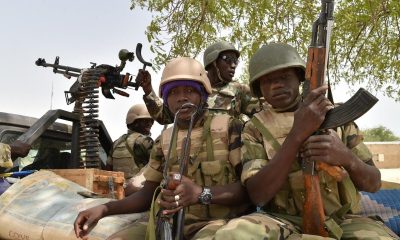
 Top stories10 months ago
Top stories10 months agoGunmen Kill 11 in Southeastern Nigeria Attack, Army Reports
-

 Analysis12 months ago
Analysis12 months agoIsrael and Iran on Edge: Tensions Escalate Amidst Rising Threats
-

 TECH10 months ago
TECH10 months agoZimbabwe Approves Licensing of Musk’s Starlink Internet Service









